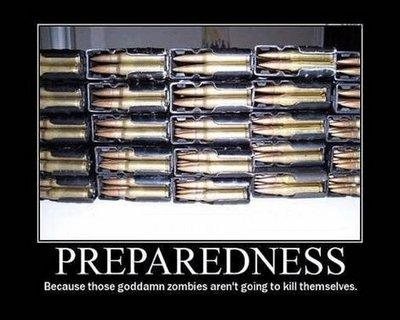Tag Archives: contaminated water
Zombie Apocalypse Teachable Moments – Straight From the CDC
Rule #1 – Make a pit stop, fill up before it’s too late
Siphoning gas…with your mouth? Gross. If you remember to always keep your tank at least half full, you can avoid having the lingering taste of petrol linger in your mouth and have enough fuel to get outta Dodge before impending disaster strikes.
Rule #2 – First aid kit, never leave home without it
We felt T-Dog’s pain when he ripped open his arm on a rusty car door while trolling the wreckage and siphoning gas. We’re assuming that you’re not scavenging for supplies on the freeway or hiding under abandoned cars to avoid walkers, but the key take away here is to always have a first kit on hand![]() . By doing so, you could avoid having to stop the bleeding with a grimy towel and some duct tape like T-Dog did…not exactly sterile supplies. T-Dog’s luck improves when Daryl offers his brother’s stash of anti-biotics (not something the CDC recommends!) and the group stumbles upon a farm conveniently inhabited by folks versed in the medical arts. Herschel’s wife is able to stitch up T-Dogs arm (now oozing puss) and prevent further infection. Always have a first aid kit on hand. If you’re really smart you’ll keep one at home, in your car, and at work. T-Dog could have avoided a lot of pain and suffering if he’d followed this simple rule.
. By doing so, you could avoid having to stop the bleeding with a grimy towel and some duct tape like T-Dog did…not exactly sterile supplies. T-Dog’s luck improves when Daryl offers his brother’s stash of anti-biotics (not something the CDC recommends!) and the group stumbles upon a farm conveniently inhabited by folks versed in the medical arts. Herschel’s wife is able to stitch up T-Dogs arm (now oozing puss) and prevent further infection. Always have a first aid kit on hand. If you’re really smart you’ll keep one at home, in your car, and at work. T-Dog could have avoided a lot of pain and suffering if he’d followed this simple rule.
Rule #3 – Clean water is zombie-free water
Zombie down the well? You might want to find a new water source. One of the most gruesome scenes of the season was when the group found a water-logged zombie in Herschel’s well, nasty right? Contaminated water is a common concern after a disaster, zombie related or other. After an emergency, especially flooding, run-off containing livestock waste, human sewage, chemicals, and other contaminants can taint water used for drinking, cooking, or cleaning. Our suggestion to Rick and his crew – don’t drink the water! If you’re ever concerned about the quality of your water after a flood or other emergency check with local authorities about water safety, you can also make water safe by boiling, adding disinfectants, or filtering.





